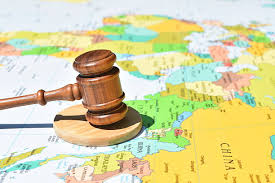An in-depth exploration of international law and its role in the global legal system.
1. Introduction to International Law
International law, an intricate and dynamic field, regulates the behavior of nations and international entities. It serves as the legal backbone for global governance and plays an indispensable role in ensuring peace, security, trade, human rights, environmental protection, and much more. As global issues increasingly transcend national borders, the demand for legal professionals knowledgeable in international law is higher than ever.
A. The Importance of International Law
International law is vital for maintaining order in a globalized world. It fosters cooperation among nations, supports the protection of human rights, facilitates international trade, and helps manage global challenges such as climate change, terrorism, and public health crises. By adhering to international legal frameworks, countries can resolve disputes peacefully and prevent conflicts from escalating into wars.
International law also extends beyond the state level, influencing the operations of international organizations, NGOs, and multinational corporations. For example, international treaties like the Paris Agreement on climate change or the Geneva Conventions regarding the treatment of prisoners of war have a far-reaching impact on the policies and practices of states, companies, and individuals worldwide.
B. Who Makes International Law?
International law is primarily created through treaties and agreements between sovereign states. Treaties are legally binding agreements that countries voluntarily enter into. In addition to treaties, customary international law, which arises from the consistent practices of states over time, and principles of general international law, which are universally recognized legal principles, play a critical role in shaping international law.
- The United Nations (UN), which provides a platform for member states to negotiate and adopt treaties.
- The International Court of Justice (ICJ), which adjudicates legal disputes between states.
- The International Criminal Court (ICC), which prosecutes individuals for international crimes such as genocide and war crimes.
2. Historical Development of International Law
To fully appreciate international law, it’s crucial to understand its historical context. The evolution of international law is closely linked to the development of the modern state system and the increasing need for regulation in international relations.
A. Early Foundations of International Law
The origins of international law can be traced back to ancient civilizations that established codes of conduct for dealing with foreign nations. The Hittites, Babylonians, and Greeks all contributed to the development of rules governing diplomatic relations, trade, and warfare.
However, the modern conception of international law emerged in the 17th century. The works of Dutch jurist Hugo Grotius, considered one of the founders of modern international law, laid the foundation for the idea that there are universal legal principles that should govern relations between states. Grotius’ treatise, De Jure Belli ac Pacis (On the Law of War and Peace), outlined rules for just warfare and diplomacy, influencing later developments in international law.
B. The Rise of the Nation-State and Modern International Law
The Peace of Westphalia (1648) marked the birth of the modern state system and the idea of state sovereignty. This treaty, which ended the Thirty Years' War in Europe, established the principles of territorial integrity and non-interference in the domestic affairs of sovereign states. These principles became central to international law and continue to shape contemporary legal frameworks.
The 19th and 20th centuries saw rapid developments in international law, especially with the establishment of international organizations and the expansion of human rights. The League of Nations, formed after World War I, aimed to prevent future conflicts but failed to prevent World War II. The aftermath of World War II led to the creation of the United Nations (UN) and the development of key international legal instruments, such as the Universal Declaration of Human Rights (1948), which set global standards for the protection of individual rights.
3. Key Areas of International Law
A. International Human Rights Law
International human rights law is concerned with the protection of individuals’ rights, regardless of their nationality. This body of law ensures that people are treated with dignity and fairness, and it has become an essential part of the global legal landscape.
- The Universal Declaration of Human Rights (UDHR): Adopted in 1948 by the United Nations, the UDHR is a foundational document that outlines fundamental human rights, including the right to life, liberty, and security.
- International Covenant on Civil and Political Rights (ICCPR): This treaty ensures the protection of civil and political rights, such as freedom of expression, the right to a fair trial, and freedom from torture.
- International Covenant on Economic, Social and Cultural Rights (ICESCR): This treaty focuses on economic rights, such as the right to work, the right to education, and the right to an adequate standard of living.
B. International Humanitarian Law (IHL)
International humanitarian law, often referred to as the law of armed conflict, is designed to limit the effects of armed conflict and protect those who are not participating in hostilities, such as civilians, medical personnel, and prisoners of war.
The Geneva Conventions of 1949 and their Additional Protocols are the cornerstone of IHL. These conventions establish rules for the humane treatment of people during wartime, ensuring that parties in conflict respect certain standards of conduct. Additionally, IHL regulates the use of weapons and prohibits methods of warfare that cause excessive harm to civilians and the environment.
4. The Role of International Law in Global Business
A. Cross-border Transactions and Investment
International business transactions often involve parties from different countries, each with its own legal system. Understanding private international law is crucial for resolving disputes that arise in cross-border transactions, including issues related to contracts, family law, and property rights.
B. International Arbitration
International arbitration has become the preferred method for resolving disputes between businesses and entities in different countries. Arbitration allows parties to settle disputes outside national courts, choosing neutral arbitrators and ensuring fairness in dispute resolution.
5. Why Study International Law?
Studying international law offers a wealth of career opportunities in a variety of fields. Whether you are interested in diplomacy, human rights, international business, or criminal law, a background in international law will provide you with the tools to engage with the world’s most pressing issues.
At Al Mithaq Institute, we offer specialized courses in international law, providing students with the skills and knowledge necessary to thrive in this exciting and ever-evolving field. Our accredited programs, available both online and offline, offer flexibility, personalized support, and comprehensive learning resources.
Conclusion: The Future of International Law
International law is evolving in response to the challenges of the 21st century. Issues such as climate change, global health crises, cybersecurity, and migration require international cooperation and effective legal frameworks. As nations navigate these challenges, the importance of international law will continue to grow.
Pursuing a course in international law, particularly at Al Mithaq Institute, equips you with the expertise to address global challenges and make a meaningful impact. Our internationally recognized programs and experienced faculty will ensure that you gain the knowledge and practical skills necessary for a successful career in international law.
Explore our courses and contact us to learn more about how we can help you achieve your goals in the field of international law.







